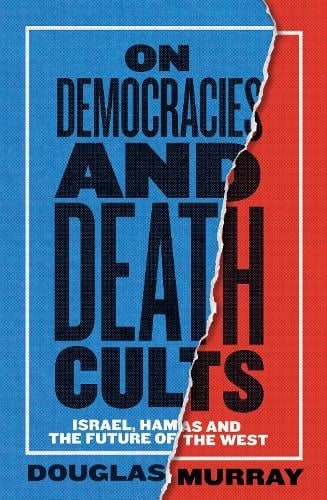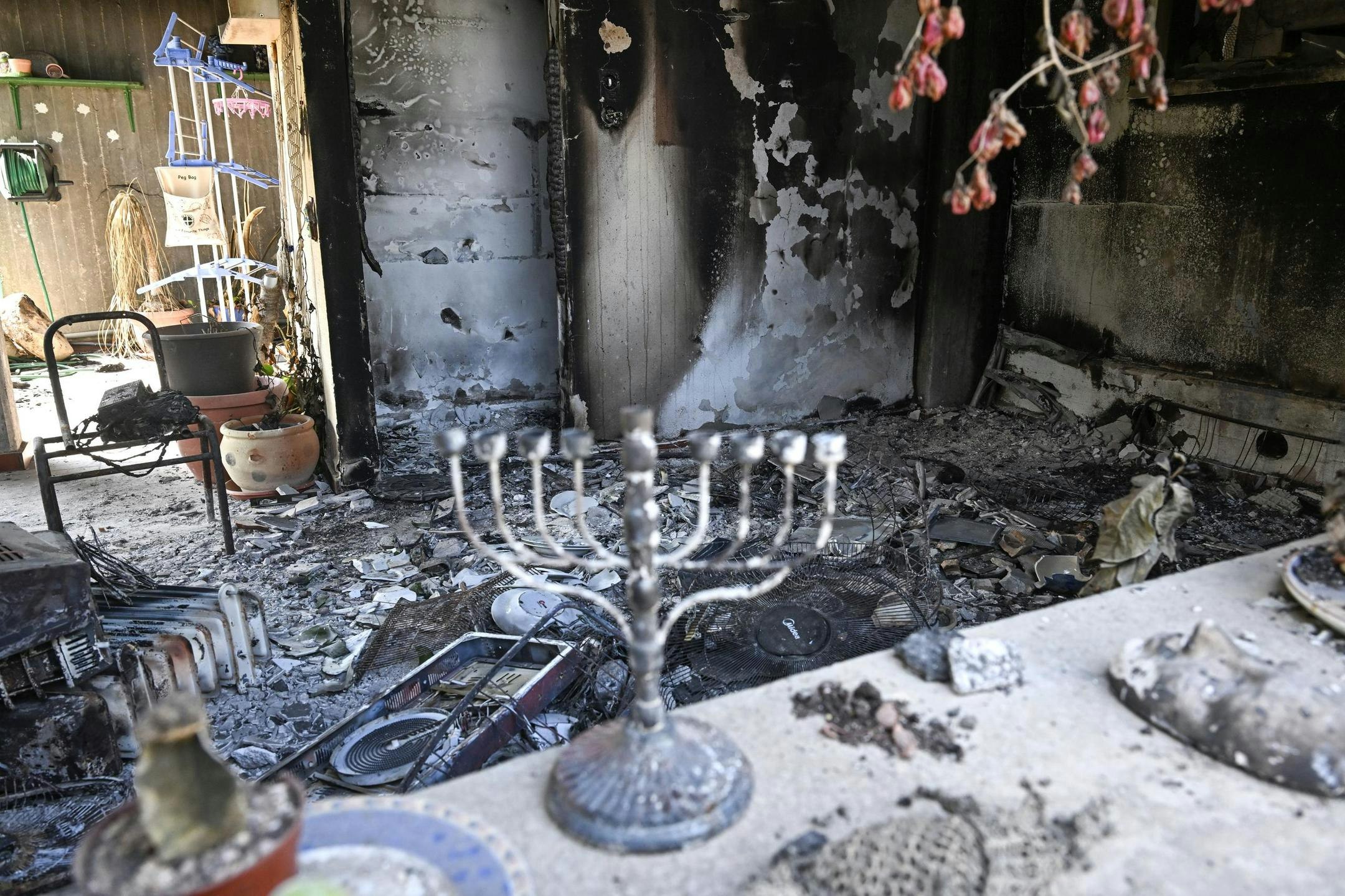This article is taken from the June 2025 issue of The Critic. To get the full magazine why not subscribe? Right now we’re offering five issues for just £25.
Are Hamas more evil than the Nazis? “The Nazis,” Douglas Murray writes in On Democracies and Death Cults, “attempted to cover over the worst of their crimes.”
Hamas have also denied the worst of the crimes they perpetrated in their appalling massacre of 7 October. True, the killers filmed their rampages as they perpetrated them. But the Dirlewanger Brigade did not have smartphones.
It is certainly possible to make a good case that Hamas are as bad, in moral terms, as the Nazis — if, as Murray writes, less able to murder at such scale. But he feels compelled to make the strongest possible argument, for On Democracies and Death Cults is less a work of analysis than of advocacy. Murray, who has been honoured by Israel’s President Isaac Herzog for being a “steadfast ally”, is making a book-length case for Israel and its actions in Gaza.

Murray’s writing on the fear and pain of Israelis and the sadism of their foes on 7 October is powerful. He reminds us, too, of how many voices on the academic left celebrated an orgy of bloodlust that entailed the murder and kidnapping of civilians (including many children). Commentators who criticise Israel, this author included, should at least reflect on the outrage that the rest of us would experience if our compatriots were murdered and held hostage.
Those of us who have been appalled by the human suffering that Israel’s campaign in Gaza has caused, meanwhile, must admit that it is difficult to know what Israel should have done. The negotiated release of a single Israeli captive in 2011, as Murray reminds us, demanded the freeing of more than 1,000 Palestinian and Arabic-Israeli prisoners, many of whom had been hardened killers. What would Hamas have demanded in exchange for the release of 251 hostages?
But On Democracies and Death Cults is an unhelpful guide to the conflict for those who are neither Israel’s friends nor foes. The book is proudly one-sided. Locating in it a mention of an Israeli crime or even error is like searching for Scotch in Kuwait.

Murray presents an overarching argument that Israeli society is Good and Palestinian society is Bad. At one point, Murray contrasts the serene reaction of the late Hamas chief Ismail Haniyeh to the deaths of some of his children and grandchildren with the grief of Gadi Eisenkot, a former chief of staff of the IDF, who lost his son and nephew. “There seems to me to be all the difference in the world between these two griefs,” states Murray: “the grief of a society that mourns for its sons and friends and a society that is happy to hear of the deaths of their own family and other people’s family.”
Like too many Palestinians, Haniyeh had been poisoned by his violent ideology. Suicide bombing could not exist if that were not the case. But seeing footage of the journalist Wael al-Dahdouh cradling the dead body of his son, having already lost his wife, his daughter and another of his sons is a difficult watch. To characterise Palestinians as broadly if not universally welcoming of the deaths of their loved ones is to obscure tremendous suffering.
Are there also Israelis who celebrate death to an obscene extent? “It is certainly true that there are some Israelis at the furthest fringes of society who do mirror some of this behaviour,” writes Murray. The furthest fringes? Itamar Ben-Gvir, who has honoured the mass murderer Baruch Goldstein, is the Israeli Minister of National Security. Does one minister define the government? Of course not. Does this represent the “furthest fringes of society”? No.
“Of all the soldiers I saw in war,” says Murray, “none took delight in their task … None take a joy or pleasure in the task they have to do.” Perhaps not. But the Israeli soldiers who have posted footage of themselves humiliating detainees, cheering destruction and playing with women’s underwear display a certain “pleasure in the task they have to do”. All armies in all wars will exhibit some amount of sadistic behaviour. The IDF is in no sense unusual in this regard. But nor are they exceptionally sober and respectful.
The facts Murray deploys always seem to be framed in a manner that is maximally sympathetic to Israel. One supposed journalist, Murray tells us, had been keeping Israeli hostages in his home. “During the war Aljamal had filed many articles about the humanitarian suffering inside Gaza,” Murray writes. “One of the news sites that he had contributed to was Al Jazeera.” Aljamal’s lone contribution to the outlet was published in 2019, not during the war.
This is a minor case of sloppy writing, perhaps, but at other, more important times, it is hard to trust the book on what is and is not a fact. “In January 2024,” Murray tells us, “two Al Jazeera ‘journalists’ were killed in an air strike in Rafah”:
Al Jazeera and much of the Western press immediately presented this as an intolerable attack on the free press. Hamza al-Dahdouh was the son of Al Jazeera’s Gaza correspondent Wael al-Dahdouh. And whilst the network complained that the Israelis had no right to hit the vehicle they were travelling in, they did not mention that these “journalists” were in a vehicle with a Hamas drone operator whilst it was targeting Israeli soldiers. Nor did they mention the fact that Wael was not in fact a “journalist” but was a member of Palestinian Islamic Jihad who was actively involved in attacks against the Israelis.
Murray’s evidence for the assertions about Hamza al-Dahdouh is that the IDF claims as much. Research by the Washington Post contradicts these claims. There is no evidence, the Post concludes, that the drone was used for anything but journalistic purposes. Could the Post be wrong? Sure.
But taking the IDF at its word is no kind of journalism. Murray’s claims that Wael and not Hamza al-Dahdouh is accused of being “a member of Palestinian Islamic Jihad”, meanwhile, is so baffling that I assume it is an unfortunate mistake. Certainly, if Murray has evidence that Wael al-Dahdouh is a member of Palestinian Islamic Jihad, it is not even mentioned by his source.
Is Murray’s unflinching support for Israel to do with their civilisational conviction? He loves the young IDF soldiers who are prepared to fight “for the survival of their families, their nation and their people”. He loves Israeli politicians for being stubborn and unapologetic. He thinks that Europeans and Americans should be more like Israelis.
Well, Europeans could do with being prouder and more stubborn. But Israel’s fight is not our own. Yes, Europe faces the threat of Islamic jihadism, but that threat has been imported. We don’t need young people who are prepared to take up arms — we need cultural and political elites that do not disdain their own struggling society or are simply irresponsible.
If Europeans have strong grounds on which to firmly align themselves with Israel, it is hard to see them
We don’t need the neoconservative bifurcation of the world into good and evil (at least beyond the epistemic dungeons of higher education). We need more of a local sense of our distinctness and our self-interest.
Yes, those whose opposition to Israel extends to advocacy for “resistance” that endangers innocent Israeli life and, in doing so, endangers innocent Palestinian life as well are contemptible. Actually, I think that Murray somewhat misunderstands such people. There is a significant degree of anti-Semitism involved in these tendencies, but when Murray suggests that European hatred of Israel is also the result of “projection” from people who believe they have been “born into countries built on ethnic cleansing and genocide”, he has missed that it is a conscious attempt to extend the critique of European societies to Israel. Third Worldists aren’t criticising Israel instead of criticising Europeans and Americans. It is part of the same destructive agenda.
Yet that does not mean we should take the opposite approach and behave as if we do all have the same attitudes and interests — confirming leftist Manichaeism but with a positive spin. It was a bad idea when Britain tagged along with the United States in its hubristic and ruinous War on Terror. If Europeans have stronger grounds on which to firmly align themselves with Israel then, on the strength of this book, it is hard to see them. This is all the more true when Donald Trump and Benjamin Netanyahu appear to be collaborating on a plan for population displacement and luxury hotel construction.
Trump’s AI-enabled dream of high-end resorts gleaming on top of Palestinian graveyards sits uneasily with Murray’s fond depiction of a life-affirming Israeli outlook. Geopolitical cynicism will always be with us. But that does not mean we have to call it poetry.












